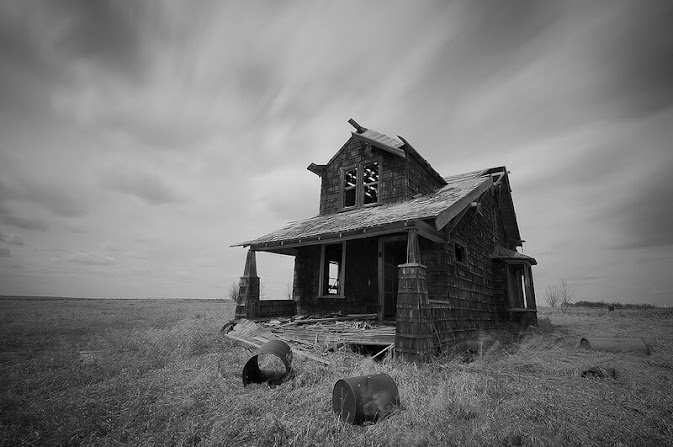"What's the use of trying?"
"Buck up - never say die. We'll get along!"
Charlie Chaplin is someone who I grew up hearing about. Even though I never saw a film of his, apart from clips over the year on television, I knew his name and his reputation. It took me 30 odd years but I finally understand why in the early 90s - eight decades or so after he began his career in films - people still spoke of his work in reverential tones. And now, three more decades after that, Charlie remains one of the greatest artists of the 20th century; His comedy timeless and his emotional resonance still unmatched in the genre.
Charlie Chaplin grew up in terrible poverty, living day by day, trying desperately to scrape by. For anyone to reach the artistic highs and the title of most famous man in the world, as Charlie did, would be incredible. That he did it through what can only be described as a crushing, Dickensian nightmare, is almost unbelievable. His mother and father were performers on the stage, so it can rightly be said that he had it in his blood. His father wasn't around very much and died young. His mother lost her voice and so couldn't perform, leading to their falling into poverty. Charlie and his brother Sydney had to learn very early on to devise ways for the family to keep their head above water. Above all Charlie was a hard worker, something that is so evident in his films; meticulously crafted in every aspect.
Before this past year (2022-2023), my only experience with silent films was the early work of Laurel and Hardy. I enjoyed those early films, but I much preferred their talkies. I felt, as I imagine many do, that I wouldn't even know how to appreciate a silent feature film. Would I look like an idiot for not getting it? Or even worse: for getting it all together too well! I felt this before when dipping my toe into Jazz. Most of the hooks that I had gathered down through the years to put me on firm footing when evaluating an album's quality, were out the window. I didn't have the chops for music theory and it was a bit scary. As with Jazz however, I needn't have worried: this was instinctual. Whether you are new to it or not, as with all great art, you feel it.
Charlie Chaplin called his silent comedies, "pantomime". The first thing to understand about this pantomime is that it isn't "missing" sound - it is its own unique form of expression, and no more needs dialogue than a great black and white movie needs colour. Charlie's short films are brilliant. Incredibly funny and inventive. It is however when he makes his first feature that he moves into unexplored creative areas and becomes the truly great artist he is still known as today.
The Kid, released in 1921, was a lightning bolt of creativity. By melding comedy with genuine emotion, Charlie created something truly new. People told him it wouldn't work, but it did. It was a fantastic success artistically, but also, no less importantly, commercially. The Kid tells the story of a child who is left by his mother, who can't raise him. Charlie's iconic character, most commonly known as The Tramp, finds the child and decides to care for him. There are many hilarious set-pieces here but what really hits the viewer is how moving the story is. Some call Charlie Chaplin sentimental, in a pejorative sense. This entirely misses the point. Why do some expect art to stand entirely separate from human experience? People are sentimental. Nearly our entire experience in life - at least the most meaningful parts - are based on love and loss. There is nothing saccharine, or artificial about The Kid and indeed the rest of Charlie's films. It is genuine emotion we feel when the child is pulled from The Tramp's arms.
Charlie's greatest work is hard to pin down, given the consistent quality across the board, but if I had to pick my favourite, it would be City Lights. City Lights is the perfect balance of hilarity and pathos and romance. The viewer wants The Tramp to succeed. He is the quintessential underdog. Mistaken as a rich man, by a blind woman selling flowers, Charlie's character makes it his mission to help her get an operation that will cure her blindness. Woven through this story are a rush of expertly designed and realized comedy set-pieces, that have not lost one bit of their ability to raise very big laughs. My favourite here is the boxing match, which is a ballet of hilarity. The comic timing here is on an entirely different level and there is a poetry to the movements that very, very few have ever approached.
The ending of City Lights is earned every step of the way, and is exceptionally romantic and sweet. It is still though tinged with sadness - the pain that they have both gone through to get here. Life doesn't always give people the happy endings they deserve, but art is something that can give us those moments and the strength to endure. With the state of things the way they are today, we need these hopeful moments more than ever.
Charlie Chaplin was a true artistic genius. He remained independent throughout his career, and actually managed to transition to talking pictures very successfully. He also went through some very hard times. He never stopped making us laugh though, even when the media and the US government was trying to blacklist him for not conforming. Everything that is beautiful and heartbreaking about life is contained within Charlie's films. The inherent tragedy that is this temporary existence. The inherent comedy in the same.






.gif)

No comments:
Post a Comment